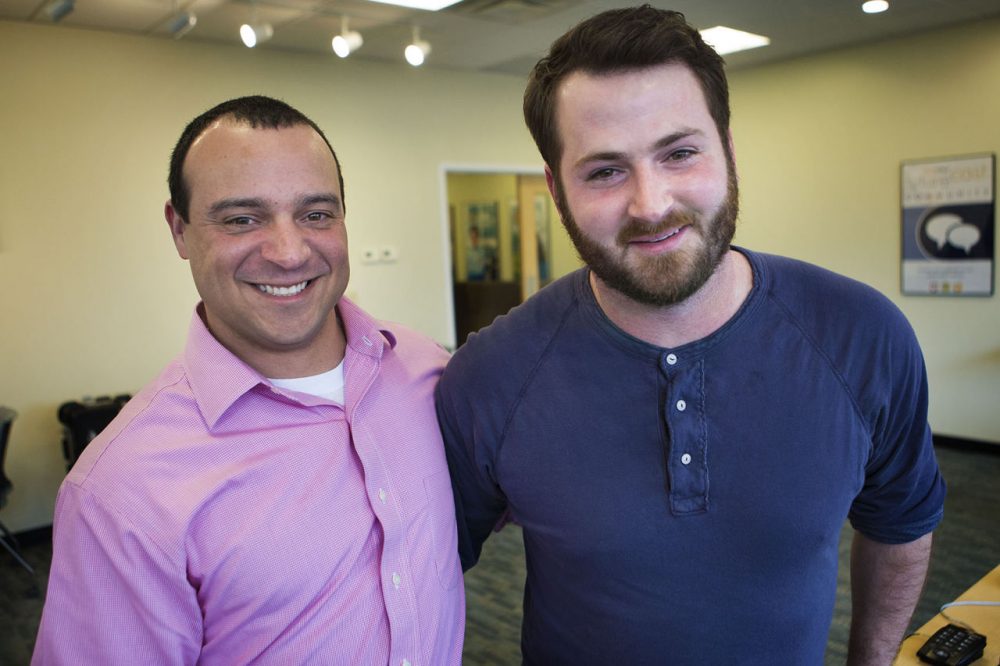Advertisement
Not Able To Get Medical Marijuana Through The VA, Veterans Struggle With Cost, Confusion
Resume
Scott Murphy is from Maynard. He was in the Army for four years and served 15 months in Iraq in 2007. Kenneth MacIntosh is from Melrose. He was a combat medic in the Navy who served in Afghanistan from 2010 to 2011. His unit's mission was to find improvised explosive devices (IEDs).
Murphy and MacIntosh both left military service with serious medical conditions. And to help ease the symptoms, they both now use medical marijuana.
Murphy uses it for chronic pain that started with a serious motorcycle accident when he was 18. It broke his femur in half and shattered his hip.
"Because of the injuries, when I got older I would've gotten arthritis. But because of the strenuous work I did in the military in rock marches and heavy lifting and stuff, it just progressed the disease," Murphy said.
MacIntosh uses it for post traumatic stress disorder.
"I was diagnosed with it when I came home from Afghanistan," he said. "Symptoms include trouble sleeping, anxiety."
Neither man can get treatment that involves medical marijuana from the Department of Veterans Affairs, even though they get all their other medical services there for free.
According to a federal government directive, providers at the VA are prohibited from recommending the medical use of marijuana for their patients. They can't even render an opinion about using it. That's the case in Massachusetts and the 22 other states (and Washington, D.C.) where medical use of cannabis is legal, because it's still illegal under federal law.
The VA did not respond to WBUR's requests for comment on the policy around prescribing medical marijuana.
Last month, a bipartisan group of members of Congress wrote to the VA, urging the agency to allow veterans access to medical marijuana through their VA doctors.
The directive that keeps VA doctors from recommending it actually expired this past weekend, so the doctors are left in limbo.
That means Murphy and other veterans who choose to use medical marijuana have to get it from outside private clinics.
Murphy and MacIntosh joined WBUR's All Things Considered host Lisa Mullins to talk about the dilemma.
Interview Highlights
On the use of medical marijuana as compared with prescription drugs for pain and PTSD:
Murphy: "[Medical marijuana] helps me because it allows me not to take an opiate-based drug. It allows me to use a medication that actually works. When I was on tramadol, which recently got classified under the Controlled Substances Act, it was never enough. My dosage kept going up until I ended up being prescribed Vicodin. And I was also prescribed a secondary drug for sleeping. Medical marijuana allows me to use one drug and not have to worry about going down the path of opiate addiction."
MacIntosh: "The cocktail [of 10 prescription drugs prescribed for PTSD] was so debilitating that my GPA at school was being affected. My ability to go to school was being affected from the sedation. But with marijuana, it actually helps during the day to focus. And then at night, if you use a marijuana with more THC, it'll actually help you sleep. And there's no real negative interaction there."
On having to go to doctors outside the VA to get certified to use medical marijuana:
Murphy: "You lose trust in your [Department of Veterans Affairs] doctor. This is supposed to be the go-to person for veterans. Because of this directive, or lack of direction from the government, I'm forced to see another doctor that I don't have the same relationship with, just for them to agree with my first doctor that I have these symptoms."
MacIntosh: "I actually have had a [Massachusetts] medical marijuana card in the past, which allowed me to use marijuana legally. However, the cost for that card is somewhat substantial. It can be up to $300 a year to [see a doctor to] reaffirm that certificate, so I haven't been able to redo it. ... The outside doctors at this point, it's a business. You go and it costs you several hundred dollars a year to have this one appointment for 30 minutes. To be honest, I just can't afford that as a student."
This segment aired on February 4, 2016.

